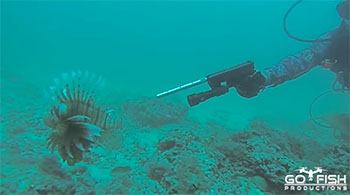Fishermen, scientists and government officials are always going to disagree on something — gear choices, quotas, forecasts, climate change and everything in between. But there’s one issue that the entire industry can get behind: Rapacious invasives have got to go.
With a customized Glock 9mm handgun, Cortland Hunt has been on the hunt for lionfish off the coast of Florida. YouTube screenshot.Lionfish is a prime example. Native to Indo-Pacific waters, lionfish have been wreaking havoc on Gulf of Mexico ecosystems since they were introduced to U.S. waters in the 1980s. They’ve been spotted up and down the East Coast, from Rhode Island to Florida, are prevalent in the Gulf of Mexico and have traveled throughout the Caribbean Islands.
Native species haven’t adapted to their presence and haven’t learned to see the invasive lionfish as a predator. Lionfish can decimate juvenile fish populations on a reef in a matter of weeks. NOAA officials have recently stated that their numbers haven’t even begun to peak.
Since the lionfish have no natural predators in American waters, stakeholders have been taking the problem into their own hands. It’s not often that fishermen are told to go after as many of a species as they can. But the burgeoning biomass of lionfish and the call to cull it at all costs has inspired people to get creative in their efforts to cull the species.
On Florida’s western coast, a man named Courtland Hunt has been shooting lionfish using a customized Glock 9mm handgun that can fire in waters nearly 100 feet deep.
“The project started to see if we could shoot a gun underwater, and it evolved into much more with the right people involved,” Hunt told the website Outdoors 360 in a brief interview.
After watching all the videos on underwater gun modifications YouTube had to offer, Hunt was tired of watching bullets destroy watermelons and wanted to run his own tests.
“I can now tell you that if a shark were to attack me at almost any depth, that a Glock 9mm would surely protect me,” he said.
If you’re not one for guns or don’t like the up close and personal approach, there’s another project brewing that aims to tackle the problem remotely.
Erika Ebbel Angle, a biochemist and the executive director of Science for Scientists, and Colin Angle, the chief executive of iRobot (the company that built the Roomba robot vacuum), are in the process of developing a robot that can be used to hunt lionfish.
 A lion fish between two electrodes during tests of a prototype of a robot designed to cull the invasive species. Ocean Support Foundation photo.A human using the robot’s underwater camera would control the remotely operated vehicle, or ROV, to hunt down the invasive fish. The killing would be accomplished through electrocution by two probes on the robot. Researchers explained that because the lionfish are at the top of the food chain, the device would not alarm them.
A lion fish between two electrodes during tests of a prototype of a robot designed to cull the invasive species. Ocean Support Foundation photo.A human using the robot’s underwater camera would control the remotely operated vehicle, or ROV, to hunt down the invasive fish. The killing would be accomplished through electrocution by two probes on the robot. Researchers explained that because the lionfish are at the top of the food chain, the device would not alarm them.
The hope is that lionfish hunting will become a sport for fishermen and ecotourists. The nonprofit behind the robot, Robots in Service of the Environment, hope to have the first commercial release by the beginning of next summer.
For the commercial sector, the Florida Keys Commercial Fishermen’s Association and its partners are ready to implement a yearlong plan that will test trapping methods and train teams of fishermen for each state to collect lionfish in pots.
According to NF correspondent Dayna Harpster, the project involves tagging lionfish to monitor any migration and necropsies to pinpoint exactly what they’re eating. Results will be shared freely in hopes of controlling what has become a virtual explosion of the invasive species.
Commitments from major nonprofits are close to being finalized to help pay the cost of the plan, which includes testing lionfish catch with 100 traps in waters near four locations throughout 2017: Murrells Inlet, S.C.; New Smyrna Beach, Fla.; Tampa; and the Florida Keys.
If you’re looking for a new hobby, lionfish hunting looks set to be the next wave in ocean safaris.







